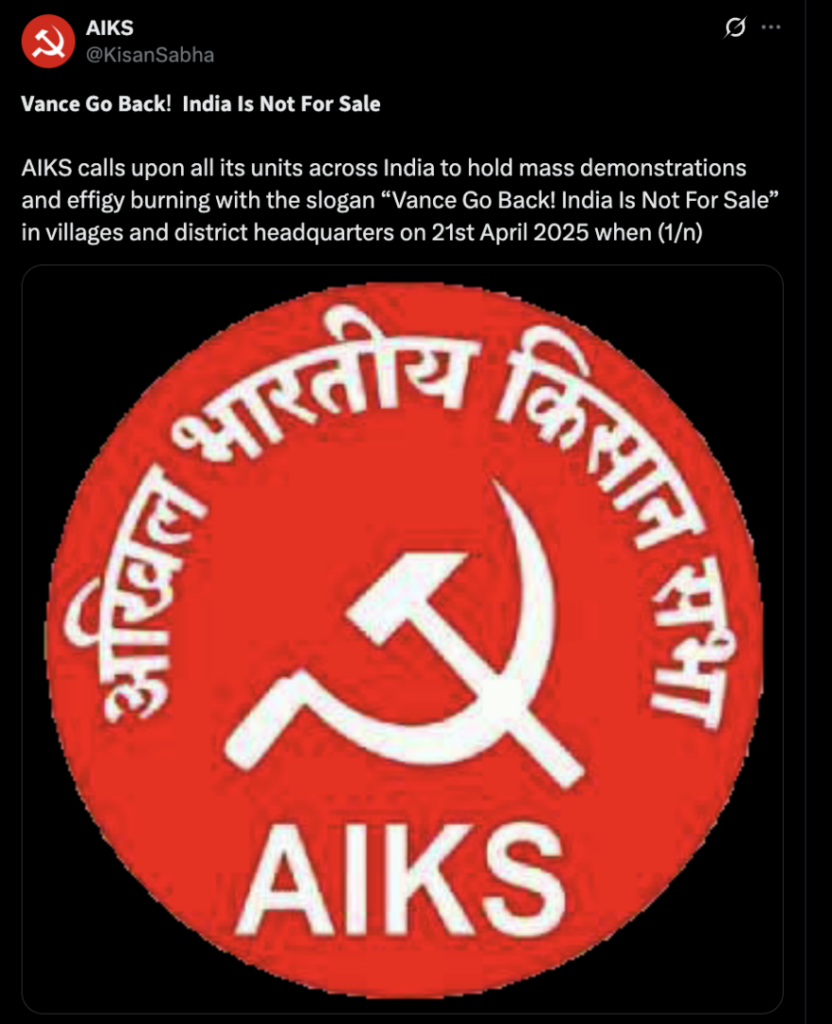U.S. Vice President JD Vance arrived in India on Monday for a four-day visit aimed at progressing with bilateral ties and fast-tracking a significant trade deal.
While New Delhi rolled out a cultural welcome, the visit prompted grassroots protests from the All India Kisan Sabha (All India Farmers Union), which fears that the proposed agreement could threaten the livelihoods of Indian farmers.
What Happened: Vance, joined by his wife, Usha Vance, their children, and senior U.S. officials, is set to conduct meetings with Prime Minister Narendra Modi and make trips to Jaipur and Agra.
On April 18, the AIKS announced its decision to stage protests on April 21 in villages and district headquarters across India with the slogan "Vance Go Back! India Is Not For Sale," with plans for effigy burnings and rallies.

Why It Matters: The U.S. is India's largest trading partner, and both nations are moving towards finalising a bilateral trade agreement that could double their trade volume to $500 billion by 2030.
The protests throw light on Indian farmers’ rising concerns over the proposed Bilateral Trade Agreement with the U.S., especially after U.S. Commerce Secretary Howard Lutnick’s persistence that agriculture should be part of the negotiations.
The All India Kisan Sabha (AIKS), aligned with the Communist Party of India (Marxist), raised alarms that the deal could flood the Indian market with cheap U.S. agricultural imports, severely harming local farmers, The Hindu reports.
AIKS argued that removing tariffs on U.S. dairy, cotton, maize, soybeans, apples, and wheat would cause prices to go down in India, sabotaging local markets.
See Also: Tesla CEO Elon Musk, Indian PM Modi Discuss Deeper Tech Ties Amid Model Y Test Run In Mumbai
The farmers' union also disparaged the Indian government for negotiating without consulting Parliament or state governments and for not adhering to labor standards. They accused the government of succumbing to U.S. pressure and not looking out for national interests, unlike countries like China, Mexico, and Canada, which stood up to Trump's tariffs.
The protestors see Vice President Vance's visit as part of a larger move to push India toward trade terms that are advantageous to multinational companies at the expense of the country's massive agricultural sector.
As India eyes closer ties with Washington and attempts to leverage benefits from changing global trade dynamics, the backlash from farmers indicates the immediate need for inclusive policymaking.
Read Next:
Image via Shutterstock
© 2025 Benzinga.com. Benzinga does not provide investment advice. All rights reserved.
Trade confidently with insights and alerts from analyst ratings, free reports and breaking news that affects the stocks you care about.